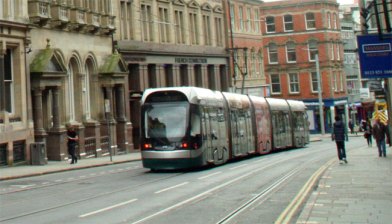Chicago Proposes “Congestion Fee” On Parking to Fund Transit

In last winter’s Chicago mayoral election, all the leading candidates made ambitious promises to increase funding for the city’s struggling transit agency. Now, with a proposed $2 “congestion fee” — really a downtown surcharge on the city’s parking tax — Emanuel plans to make drivers pay their fair share and use the proceeds to build a new rail station and the city’s first bus rapid transit line.
Under Emanuel’s plan, anyone parking in a downtown lot or garage would be required to pay an additional $2 on top of the existing parking tax. Drivers parking on the street or in residential garages wouldn’t be taxed, though according to the Chicago Tribune, some transportation advocates want to see the fee extended to downtown meters. According to the Sun-Times, the fee would raise roughly $28 million.
Emanuel and his transportation commissioner, Gabe Klein, want to use that revenue to complete two important transit projects. A new Green Line station at McCormick Place would allow for transit-oriented development in a fast-growing part of the city. A bus rapid transit system with dedicated, camera-enforced lanes, priority at traffic signals and off-board fare payment will be put into place for a new downtown circulator route.
An earlier version of the same plan was put forward by Mayor Richard M. Daley in 2008, with parking fees that would have gone up to $8 a day to fund an even wider BRT system, but opposition kept that plan from being enacted before a federal deadline passed.
For New Yorkers, the substance of Emanuel’s plan isn’t groundbreaking. The Chicago BRT line looks like it will have roughly the same features as New York City’s Select Bus Service, and New York already charges an 8 percent surtax on parking in Manhattan; with daily parking rates in Midtown averaging $41, that works out to about $3.25.
The politics of the proposal, however, look awfully foreign. The parking fee isn’t paying for the rail station or bus line on its own (the Green Line station alone will cost $50 million). Putting the two together is, as the Sun-Times reported, a political strategy to build support for Emanuel’s budget. In other words, “Rahmbo,” the hard-nosed operative who once plunged a steak knife into a table while shouting the names of his political enemies, thinks that pairing higher costs for drivers with improved transit is a political winner.
That’s not something you’re likely to see in New York City, despite a significantly lower rate of car ownership. Though a number of pols are ahead of the city when it comes to supporting full-featured BRT, many segments of the political class are more likely to complain that a bus lane eliminates highly subsidized on-street parking.
